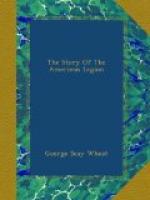Comrades of the Great War
Veterans of the Great War
Liberty League
Army of the Great War
Legion of the Great War
Great War Legion
The Legion
The American Comrades of the Great War
The Great Legion
The American Legion
The last was tentatively decided upon as the best name although there was considerable discussion on it. This discussion waxed particularly warm between a colonel and a corporal and it came to an end only when some hungry enlisted delegate braved the officer’s rising ire to move an adjournment for lunch. The motion carried immediately and, true to the understanding made at the outset in regard to rank, the corporal clicked his heels together, stood at attention and saluted the colonel, when the latter passed him on the sidewalk exactly five minutes after he had been telling the colonel precisely what he thought of him and his opinions—at least as far as the name of the Veteran’s Organization was concerned. I might add that this colonel was well under thirty-five years of age and that the corporal was only twenty-one.
And this brings to mind another striking feature of this most unusual gathering, which was the comparative youth of its membership. For instance the two individuals who have taken from the beginning the leading parts in the movement, Bennett Clark, son of Champ Clark and a Lieutenant Colonel of infantry, and Theodore Roosevelt, Jr., son of the ex-president and also a Colonel of infantry. They are respectively twenty-nine and thirty-one years of age, and one of the most brilliant speeches in the caucus was made by a captain of twenty-six.
It must not be understood from this rather dry recital of what took place at the Paris Caucus, this record of minutes and resolutions, that it was an entirely sedate and dignified gathering. On the contrary, Young America was there and quite often the impression which one gathered was that a dozen or so Big Brothers had been turned loose at once. A great many wild speeches were made and all sorts of ticklish questions were brought up. Chairman Clark broke two gavels and three times overturned his table. Everyone there was young. Peace was young. Few knew exactly, like Bishop Brent, just what was wanted. The whole project was new. Dozens of delegates wanted to speak; it was their first chance since April 6, 1917. In fact one man made two very violent speeches on the same subject, one in direct opposition to the other. He realized he was making a heated argument for both sides and finally sat down laughing about it. Who was he? Who was the colonel who got wrought up over the proposed name? Who were the lieutenants, and who were any of these privates, captains, and sergeants?
“I don’t know.” Nobody knows.




